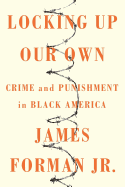
In Locking Up Our Own, Yale Law professor James Forman Jr. uses comprehensive research, his personal experience as a public defender in Washington, D.C., and an open mind to illustrate how the crisis of mass incarceration in the United States was constructed incrementally over a 40-year period, examining in particular the role that African Americans unwittingly played in that effort, which has made the U.S. the world's largest jailer.
Part one looks at the origins of mass incarceration: the war on drugs, gun control and the rise of African Americans in politics and law enforcement. Despite some successful state-level efforts in the 1970s to decriminalize marijuana, black lawmakers and communities railed against the movement. In this area, as in others Forman covers, the logic behind lawmakers' and voters' decisions to be tough on crime is an effort to help the African American communities. However, they result in different consequences altogether, which Forman goes on to examine in the second half of his book.
Forman's comprehensive research and analysis, as well as his compassion and personal experiences, make Locking Up Our Own a powerfully important and accessible glimpse at the U.S.'s punitive criminal justice system. His observation that the country always makes room in prisons, but can't do the same in drug treatment centers, is telling of misplaced priorities. Furthermore, he recognizes that repetitive efforts to treat root problems such as education, income inequality, employment and health care rarely, if ever, take precedence over punishment. Forman's voice is one of logic and reason, and in his epilogue it is also one of benevolence: "What if we strove for compassion, for mercy, for forgiveness?" --Jen Forbus, freelancer

